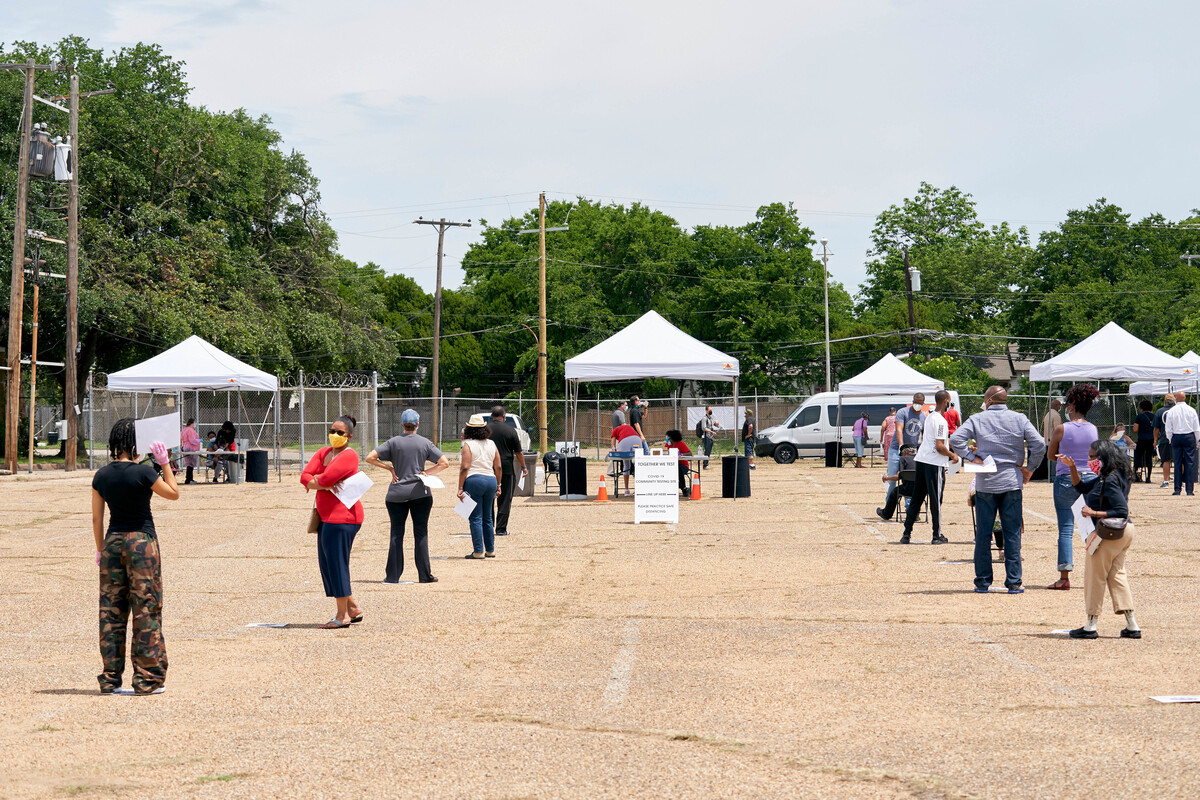To Combat Disparities, Black Churches In Dallas Offer Coronavirus Testing

Enlarge this image
Visitors stand in line during Project Unity’s «Together We Test» coronavirus testing at a Friendship-West Baptist Church campus in South Dallas, Texas on May 28, 2020.
Cooper Neill for NPR
hide caption
toggle caption
Cooper Neill for NPR

Shots — Health News
In Large Texas Cities, Access To Coronavirus Testing May Depend On Where You Live
Neighborhoods in South Dallas, where there are more people of color, have fewer sites offering coronavirus testing than whiter North Dallas, just a few miles away. They also have less health care access more broadly.
These disparities mean the experiences people have when seeking a test can be quite different, depending on where they live, as well as their income or fluency in navigating the health care system.

Enlarge this image
Frederick Haynes, senior pastor of Friendship-West Baptist Church in south Dallas, poses for a portrait during Project Unity’s «Together We Test» coronavirus testing at a Friendship-West campus in South Dallas, Texas, on May 28, 2020.
Cooper Neill for NPR
hide caption
toggle caption
Cooper Neill for NPR

Enlarge this image
Arthur Gillum and Alice M. Gillum underwent nasal swab and antibody blood tests at a Friendship-West Baptist Church campus, the first of several black churches in the area to host weekly coronavirus testing.
Cooper Neill for NPR
hide caption
toggle caption
Cooper Neill for NPR

Enlarge this image
Volunteer Leona Redmon greets visitors who arrived by car.
Cooper Neill for NPR
hide caption
toggle caption
Cooper Neill for NPR

Shots — Health News
What Do Coronavirus Racial Disparities Look Like State By State?
In Dallas, these inequities are made worse by the fact that the private health care system places more services in whiter areas.
Haynes says he appreciates what local officials are doing to bring tests to South Dallas, like having two large federally-funded drive-thru sites, one in South Dallas and one downtown, and new temporary testing sites there as well. The City of Dallas also has a mobile service.
But Haynes says many black people don’t necessarily trust official channels, due to past abuses by the medical industry.
«Let’s use our trusted institutions,» Haynes says. «The most trusted institution in the black community is the black church.»
Getting tested in North Dallas
For some in North Dallas, a predominantly white area, not having symptoms of COVID-19 still made it difficult to get a test. The difference there, however, is that money and health care services are often more accessible.

Enlarge this image
Lindsay Pope, who lives in a neighborhood in North Dallas, needed a coronavirus test prior to her elective surgery. She used a service which came to her house to administer a diagnostic test and two antibody tests for her and her husband.
Bret Jaspers/KERA
hide caption
toggle caption
Bret Jaspers/KERA

Enlarge this image
Visitors stand in line during Project Unity’s «Together We Test» coronavirus testing at a Friendship-West Baptist Church campus in Dallas, Texas on May 28, 2020.
Cooper Neill for NPR
hide caption
toggle caption
Cooper Neill for NPR
Visitors stand in line during Project Unity’s «Together We Test» coronavirus testing at a Friendship-West Baptist Church campus in Dallas, Texas on May 28, 2020.
Cooper Neill for NPR
State says it will tackle disparities
Texas Governor Greg Abbott announced June 8 the state will expand testing in underserved communities. It’s a promise to bring equity to the two sides of Dallas and other cities.
Texas’ case numbers have been increasing in the last two weeks, something the state partially attributes to increased testing in high-risk places like prisons. Still, the state is among the lowest in per capita testing, and its seven-day testing average is still slightly below Abbott’s declared goal of 25,000 tests a day.
Some experts have said Texas needed to be conducting over 27,000 tests a day before reopening, which it started to do on May 1.
This raises the question of whether the state is missing flare-ups. Clendenin says as many people as possible need to be tested in order to know the extent of the outbreak.
Audrey Carlsen contributed to this report.














Комментарии 0